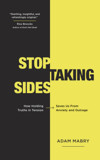
It was a hot July afternoon, and 14-year-old me was headed back home from summer camp with the church youth group. A new kid was waxing philosophical, using words like “sovereign” and “election”—words I had not encountered. I barely understood what he was saying. A few rows back on the bus, I was only half-listening. But, when he uttered that word—predestination—I sat up. I didn’t know what he meant, but I knew I didn’t like it. Was this guy suggesting that God chooses some people but not others?
Maybe it was the heat at the back of the van, beyond the air conditioner’s reach. Maybe it was the friction of strange ideas abrading my own. Or maybe it was just the fear of encountering concepts I wasn’t sure of. Whatever the reason, I loosed off my entire arsenal of biblical argumentation against this offensive idea (which, as I had only been a Christian for a few years, took mere minutes). From a few rows forward my new not-friend pushed back, and before long things got heated, so we thought it best to let the conversation break off. But a few weeks later, he handed me a copy of John Piper’s Desiring God. “Read this,” he said. “Then, let’s talk.” Since he was older than me (which seemed very important at the time), I took the book, thanked him, and didn’t read it.

How to embrace the tensions in the Bible in order to overcome division, anxiety, and fear.
The book sat forgotten on my shelf for months. I’d no intention of reading it, yet I was afraid to give it back. What was I to say? “Thanks for this. I didn’t read it”? Eventually pride, peer pressure, or something else got the better of me, and I opened it up and started to read. It was akin to being judo flipped. I was offended to learn that this guy—a famous pastor-author—taught this idea. I was shocked to find out that Scripture appeared to support it. And then I hit a problem: the more I read, the more I realized that I might be wrong. Over time, my worry transformed into worship and my indignation into exaltation. I reread it. Then I re-reread it. Then I read J.I. Packer’s Knowing God. Then R.C. Sproul’s The Holiness of God. Then I did a Bible study through the book of Ephesians for a whole year. It kindled a deepening passion for this surprisingly sovereign God who I thought I had understood.
Being young and foolish, I now entered into the “cage stage” of theological awakening—where passion to share a newly discovered doctrine runs roughshod over love for others. So it was that the following summer, on another youth trip, there was another van scene and another “bite-off-more-than-we-can-chew” discussion about God.
But now I was the reformer, and now I was preaching the doctrines of grace with all the gracelessness of an inquisitor. I had texts. I had quotes. And I had a captive audience.
Arriving at our destination, I was surprised to discover that not everyone appreciated my doctrinal passion. Settling to bed, my roommates—my friends—seemed to be avoiding me. With the same boldness I had earlier showed, I asked why. They told me. I may have been right— they weren’t sure and they admitted as much. But I wasn’t loving—about that they were quite sure. One friend put it this way: “I don’t know if you’re right, Adam. But the way you’re acting makes me want nothing to do with this idea, if this is what it turns you into.”
They didn’t feel they’d been near Jesus—just near a jerk.
I’m here simply to say this: if we care more about being right about Jesus than following the way of Jesus, it won’t matter that we’re right about Jesus.
Conversations like this are too common. A brief scan of the comments section of a Christian website or a YouTube video will give you abundant proof that believing right doctrine— in this case, that God is sovereign over human affairs—is no guarantee of love. Knowledge puffs up (1 Corinthians 8 v 1), especially knowledge about God. Anyone who increases in knowledge risks arrogance—a risk multiplied when the subject is God. Of course, arrogance is not the wholly owned subsidiary of any theological position. My point—if we have eyes to see—is that the tension in which the Bible sets the doctrine of God’s sovereignty is the Bible’s solution to this difficulty. The good news for us is that God loves neatniks, newcomers, and everyone who has ever been confused about how exactly to resolve the tension between God’s sovereignty and human responsibility.
Resolving sovereignty and responsibility isn’t my aim so much as showing how the Bible teaches us to hold this tension. The Bible teaches that God is in control and that our decisions matter. His will will be done, and he will hold us responsible for ours. God chooses his people, and we are responsible for trusting God. Many men far greater than me have theologized and philosophized about these biblical realities, drawing ever nearer to that horizon of mystery. I won’t be doing that here. I’m here simply to say this: if we care more about being right about Jesus than following the way of Jesus, it won’t matter that we’re right about Jesus. I want you to see what took me so long to learn: the Bible’s strategy isn’t to explain God systematically but to confront us with truth in tension—to show us that paradox and mystery aren’t bugs but features we must learn to lean into and not hide from. The Bible’s teaching on sovereignty and responsibility is not an either-or truth tournament, nor an “emphasize one element and briefly acknowledge the other” discussion. It is a tension—one that requires bravery to embrace mystery.
Here are a few ways that you can live in the tension, hone your humility, and hopefully fare better than I did back on the bus at those summer camps.
Admit Ignorance. Where Scripture is clear, we should be too. But where it’s not, we venture mere guesses. Educated guesses? Maybe. Wise guesses? Possibly. But guesses nonetheless. The Bible doesn’t tell me God’s sovereign will in a particular tragedy. In a crime, God doesn’t reveal the exact distribution of individual responsibility. So let’s not pretend otherwise. Bravely declare the bold and the clear. We cling to the truth that God’s providential purposes are always good; but, we are free humbly to admit our ignorance about God’s specific purpose in a specific circumstance. “I know that what God’s doing is good, but I don’t know how right now” is usually wisdom. Guessing at anything deeper is often folly—drawing firm conclusions about anything deeper almost always is.
Accept Responsibility. God’s sovereignty doesn’t get rid of human responsibility; it grounds it. If God weren’t keeping the chain of cause and effect connected, it would cease to exist. Decisions only lead to outcomes because God has decided that they shall continue to do so. So, embrace responsibility, strive for holiness, work for the goal of your heavenly calling, and serve the King with all your might. No excuses.
Worship Passionately. Incomprehension is a prerequisite of passionate praise. When your favorite sports star pulls off an amazing play and you don’t know how they did it, you shout about it. When a musician executes a virtuoso line, you don’t comprehend it, yet you greatly enjoy it. We praise and worship that which induces wonder. God’s ways are higher than mine. Sometimes I can glimpse something he’s done, in a way I would never have mapped out or imagined. Always I can look back to the cross to see the greatest thing he’s done, in a way you and I would never have planned nor asked for. Comprehension is not a pre-requisite for wonder. So, in any circumstance, worship him passionately. His goodness is never in doubt, only our ability to comprehend his good plans.
God’s sovereignty is no enemy of your responsibility. Your responsibility does not undermine his sovereignty. Live in the tension, and watch yourself grow in humility as you worship and obey our great God.
Adam Mabry is the author of Stop Taking Sides. In this compelling, inspiring, and at times provocative book, Mabry urges us to stop taking sides and refuse to participate in tribalism by mapping out a way to hold in tension truths that we so often divide over.